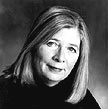 |
Barbara Ehrenreich wrote this response to
our 6
initial questions, the same questions we ask all the featured
guests.
Barbara: Perhaps you mean borders metaphysically here, but I'm going
to use the term more literally. I grew up in world starkly demarcated
by various kinds of borders — the Iron Curtain, the Berlin
Wall, the racial boundaries enforced in the segregated south —
and I tend to measure progress in the dissolution of borders and
the collapse of barriers. Compared to 30 years ago, we are freer
to travel around the world and mingle with people of different nationalities
and races. On the gender front, we are no longer separated in men's
and women's help-wanted ads, or "men's world" and the
"distaff side."
One kind of border that has concerned me for a long time is that
dividing people by social class, and one way this has been maintained
is through the professions. With all due respect for expertise and
educational achievements, our professions in many cases represent
the strongholds of a relative economic elite, and operate to keep
others "in their place." You can't, for example, go from
being a practical nurse to a registered nurse without spending time
and money on further formal education — no matter how skilled
you are as a nurse. Similarly, you can't get into medical school
without passing a course in calculus, although the need for calculus
is extremely unlikely to arise in the practice of medicine. Professional
requirements like these, as I argued in my book Fear of Falling,
have often been used to exclude the poor and working class from
lucrative and powerful occupations.
I myself crossed the border into the professional world when I acquired
a Ph.D., and that experience reinforces my sense of the artificiality
of
professional distinctions. Although my Ph.D. is in cell biology,
it is
usually considered an entrée into the professional world
in general — for example, as a potential asset if I were to
try to get a college teaching job in, say, sociology. Which makes
no sense. On the other hand, although I have written a number of
books on historical themes, I am only an "amateur" at
that and entitled to no special title or position.
Now I'm all for education, and believe that higher education should
be
free and open to any qualified person at whatever age they choose
to seek it. But it worries me that a growing number of jobs require
a bachelor's degree — for no obvious reason except insofar
as your ability to get through four years of college signals a capacity
for following instructions, meeting deadlines, etc. Many brilliant
and capable people cannot afford a college education, and hence
are often confined to jobs that underutilize their talents. (I know,
because there are a lot of such people in my family!)
What I'd like to see — in addition to universal, free higher
education —
is a re-examination of our professional borders: If a person does
poorly in calculus or organic chemistry but shows great caring and
communication skills, maybe she should be admitted to medical school
on the strength of those skills. If I write history books, maybe
I should be considered a historian. I'm thinking also of a woman
I met recently who had managed to rise from welfare to playing a
crucial administrative and service role in a charitable organization.
She is widely admired in her community, but she may lose her job
soon because a federal grant the organization has applied for requires
that anyone in her position have at least a B.A.
I'd like to see a little more flexibility at our national borders
too, more openness to people fleeing from persecution or dire poverty.
The sight of Haitians diving overboard from a small boat to evade
the INS off of
Florida recently shook me: Could they all swim? What about the babies?
Or, a few years ago, the even worse sight of INS border guards attempting
to drive would-be refugees (I forget whether they were Cubans or
Haitians) into the sea with fire hoses. Not to the mention the steady
pile-up of corpses at the U.S.-Mexican border. No, not everyone
in the world can live in the U.S., but I hate to see our national
borders become increasingly militarized and impassable to many who
really need a refuge.
|
 |
 |


![]()






